#stephanie bidmead
Explore tagged Tumblr posts
Text
"LITTLE WOMEN" (1970) Review
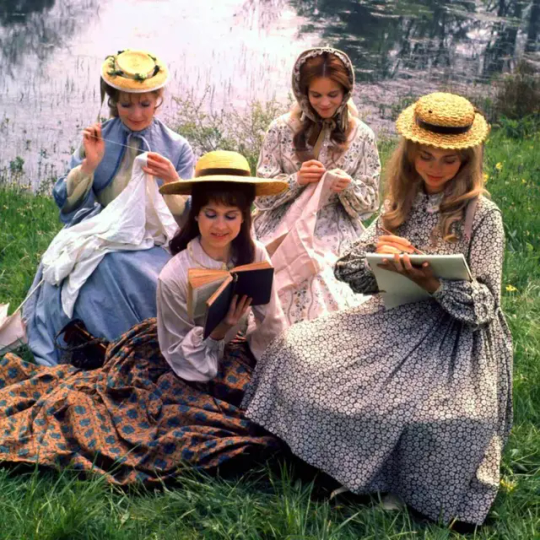
"LITTLE WOMEN" (1970) Review
It is very rare to find a British adaptation of an American novel. It is even rarer to find more than one adaptation. Louisa May Alcott's 1868 novel, "Little Women" must have been very popular with the BBC network. The latter had adapted the novel four times. Several years ago, I had seen the network's 2017 version. I thought it was the only version adapted by the BBC . . . until I had stumbled across the 1970 adaptation.
Set during the 1860s decade, "LITTLE WOMEN" told the story of the four March sisters of Concord, Massachusetts and their coming of age stories during and after the U.S. Civil War. With second daughter Josephine aka Jo serving as the story's main protagonist, the miniseries focused on the sisters' struggles with the family's diminished finances, their personal ambitions and especially their love lives. Early in the story, the March sisters become acquainted with their neighbor, one Theodore "Laurie" Lawrence, grandfather Mr. Lawrence and his tutor, John Brooke. Whereas third sister Beth develops a friendship with the elderly Mr. Lawrence, oldest sister Meg falls in love with Mr. Brooke, and the youngest Amy develops from a slightly vain and coddled child to a mature and self-assured young woman. As for Jo, the story focused on her development from a temperamental and stubborn girl, who learns to maintain her hot temper, navigate through her relationships with two men and adhere to her ambitions to become a writer.
Another surprising aspect of "LITTLE WOMEN" that I had learned was that it was the longest adaptation of Alcott's novel with a total running time of 225 minutes. This gave screenwriters Alistair Bell and Denis Constanduros to be as faithful to Alcott's novel as possible. Were they? Somewhat. The pair did take care to explore Laurie's volatile relationship with his grandfather - something that a good number of the other adaptations had failed to do. And it allowed glimpses into his growing relationship with Amy in Europe. Also, the early stages of Meg's marriage to Mr. Brooke ended up being explored, something that only the 2019 movie adaptation had repeated. I believe the miniseries did a very solid job of conveying these aspects of Alcott's novel.
But the miniseries left out Meg and Laurie's experiences at Annie Moffat's party. The miniseries also left out the sisters meeting with Laurie's English friends - something only the 2017 adaptation had included. Bell and Constanduros had changed the time period of Amy's near drowning at Walden Pond from the winter to either the spring or summer, allowing a rickety pier to send her into the pond, instead of thin ice. And it never touched on Amy's violent encounter with her schoolteacher over pickled limes. Did these aspects of the screenplay harm the production? Hmmmm . . . perhaps not. But I do feel that the miniseries' increased emphasis on the Lawrence men's relationship came dangerously close to overshadowing the March sisters' own relationships. I am relieved that the miniseries managed to focus somewhat on Jo's relationship with Professor Bhaer. However, I do have a problem with the sexist manner in which Constanduros and Bell had the professor viewed his future marriage to Jo. Whatever admiration Professor Bhaer had for Jo's writing skills seemed to fly out of the window in his anticipation of her being a good wife. Superficially, I had no problems with the brief focus on Meg and John's marriage, even if it could have been somewhat more thorough. But I believe it exposed what I believe was one of the miniseries' main problems.
"LITTLE WOMEN" did have its share of problems. Like the 1978 television adaptation, it is clear to see that it suffered somewhat from a low budget. If I must be frank, that seemed to be more obvious in this adaptation. Aside from Amy's near drowning at Walden Pond and some of European settings featuring Amy and Laurie, all other scenes had obviously been shot inside a studio. Very disappointing, considering a good number of BBC productions featured a mixture of interior and exterior shots. I found the actresses' makeup and hair - especially the latter - to be inconsistent and frankly, a big mess. Betty Aldiss' costume designs seemed solid enough, but not particularly earth shattering. Although the cast solely featured British performers, I believe a handful of them managed to handle American accents quite well - especially Stephen Turner, Stephanie Bidmead and Martin Jarvis. But despite their solid or excellent performances, the rest of the cast seemed to struggle maintaining one. And could someone please explain why three of the actresses who portrayed the March sisters seemed to be incredibly loud? Nearly every time one of them spoke, I had to turn down my television's volume. Some have explained these scenes featuring quarreling between the four sisters. They have even gone as far to claim this adaptation was the only one that featured the sisters often quarreling. Well, they would be wrong. Nearly every adaptation (I am not certain about the 1933 movie) of Alcott's novel featured quarrels between the sisters. So, this explanation does not strike me as a good excuse for the loud voices.
Judging from the previous paragraph, one would assume I have a low opinion of the majority of performances featured in "LITTLE WOMEN". Not really. Most of the performances featured in the miniseries struck me as pretty solid. Actresses Angela Down ("Jo"), Jo Rowbottom ("Meg"), Janina Faye (Amy) and Sarah Craze ("Beth") all gave solid performances and managed to capture the nuances of their individual characters in a competent manner. As I had stated earlier, I had a problem with most of them - with the exception of Craze - resorting to loud and histrionic voices in their portrayals of the March sisters at a younger age or in the case of Rowbottom, engaged in a heated quarrel. I thought Jean Anderson gave a solid performance as the stuffy Aunt March. Frederick Jaeger gave a very likeable performance as Jo's love interest, the intellectual Professor Friedrich Bhaer. And I believe the actor had a solid screen chemistry with Down. I really had a problem with actress Pat Nye, who portrayed the family's housekeeper, Hannah. Nye's handling of Hannah's American accent struck me as ridiculously exaggerated . . . to the point that her accent almost seemed Southern. Patrick Troughton, a talented actor in his own right, had more or less been wasted in his role as the family's patriarch, Mr. March. I do not believe he had spoken more than three to five lines in this production.
I can think of at least four performances that really impressed me. It seemed a pity that not one of them came from the four actresses who portrayed the sisters. Oh well. John Welsh has my vote as the second best version of Mr. James Lawrence, the March family's wealthy neighbor. I thought he did an excellent job of developing his character from a strict and curmudgeon guardian to a warm-hearted man who learned to develop a relationship with his grandson. Most portrayals of John Brooke, Meg's future husband, have never impressed me. But I must say that I found Martin Jarvis's portrayal of the character more than impressive. The actor was given an opportunity to delve more into Mr. Brooke's personality and he ended up giving one of the better performances in the miniseries. If given the chance to vote for the best performance in "LITTLE WOMEN", I would give it to Stephen Turner for his portrayal of the sisters' close friend, Theodore "Laurie" Lawrence. I suspect Turner had greatly benefited from Bell and Constanduros's script, which seemed more interested in Laurie as a character than the four leads. But judging from Turner's performance, I suspect his would have overshadowed everyone else's due to the actor's superb handling of the character. I also have to compliment Stephanie Bidmead's portrayal of the March family's matriarch, Mrs. "Marmee" March. Not only did I find her performance warm and elegant, but it also lacked the dripping sentimentality of the earlier versions and the heavy-handed attempts to make the character "modern" - relevant to today's movie and television audiences.
"LITTLE WOMEN" had its flaws. I cannot deny this. But I feel its flaws - which included a limited budget and some questionable American accents - were not enough to dismiss the nine-part miniseries as unworthy. I believe the 1970 miniseries proved to be a lot more solid and entertaining than some fans of Alcott's novel believed, thanks to Paddy Russell's competent direction, a damn good screenplay by Denis Constanduros and Alistair Bell, and a first-rate cast led by Angela Down.
#costume drama#period drama#period dramas#little women#little women 1970#louisa may alcott#little women bbc#jo march#angela down#meg march#jo rowbottom#janina faye#amy march#sarah craze#beth march#stephanie bidmead#stephen turner#martin jarvis#frederick jaeger#patrick troughton#pat nye#u.s. civil war#john welsh#paddy russell#denis constanduros#alistair bell
9 notes
·
View notes
Text

Time Ram: A Good Man Fucks Us Up
Don't be lulled by the Easy Yellow alert; this is Time Ram's darkest hour, as our hosts must find a way to make A Good Man Goes to War in the Troughton era, without any earlier Rammed stories to draw from. Lucky for me, it's now two years later, so I can confidently say that the Doctor goes to Demon's Run to rescue Polly, allied with the Silurians, the Kaldor Robots, the Robo-Pleasence, Sabalom Glitz, all of whom are now from the Hartnell era, and the Meddling Monk, who isn't! Or something like that, probably. Ben cusses out some cybermen. Susan's ring results in hyperbabies. Continuity is probably going to keep collapsing even worse now. Oh my giddy aunt...
Featuring Diana Rigg as River Song and Stephanie Bidmead as Madam Kovarian!
Alt under the cut

#art#fan art#my art#doctor who#time ram#second doctor#patrick troughton#ben jackson#polly wright#jamie mccrimmon#a good man goes to war#a good man fucks us up
25 notes
·
View notes
Text
"Little Women" and Shakespeare
Because I like making lists and finding connection between different things, and because Little Women has become one of my hyperfixations, I thought I'd answer this question:
How many actors from the various filmed versions of Little Women have also performed Shakespeare?
I'm sure this list is incomplete, but it's as comprehensive as I felt able to make it:
Katharine Hepburn (Jo, 1933 film): No Shakespeare roles onscreen, but she played several onstage: Rosalind in As You Like It, Beatrice in Much Ado About Nothing, Portia in The Merchant of Venice, Isabella in Measure for Measure, Katherina in The Taming of the Shrew, Viola in Twelfth Night, and Cleopatra in Antony and Cleopatra.
Edna May Oliver (Aunt March, 1933 film): The Nurse in the 1936 film of Romeo and Juliet with Leslie Howard and Norma Shearer.
Elizabeth Taylor (Amy, 1949 film): Katherina in the 1967 Franco Zeffirelli film of The Taming of the Shrew.
C. Aubrey Smith (Mr. Laurence, 1949 film): Lord Capulet in the 1936 film of Romeo and Juliet with Leslie Howard and Norma Shearer.
Angela Down (Jo, 1970 miniseries): Cordelia in the 1975 BBC King Lear with Michael Hordern, and Helena in the 1981 BBC All's Well That Ends Well.
Stephanie Bidmead (Marmee, 1970 miniseries): Hippolyta in the 1959 NBC A Midsummer Night's Dream and Lady Capulet in the 1967 BBC Romeo and Juliet.
Patrick Troughton (Mr. March, 1970 miniseries): Horatio in the 1947 BBC Hamlet, the Player King in the 1948 Laurence Olivier film of Hamlet, Edmund in the 1948 BBC King Lear, Seyton in the 1949 BBC Macbeth, and Tyrell in the 1955 Laurence Olivier film of Richard III.
Martin Jarvis (John Brooke, 1970 miniseries): Narrator of Shakespeare: The Animated Tales' 1992 adaptation of The Tempest and Leonard (Leonato) in the 2005 ShakespeaReTold adaptation of Much Ado About Nothing.
Logan Ramsey (Mr. Dashwood, 1978 miniseries): The Bishop of Carlisle in the 1982 TV film of Richard II.
Ben Wright (Dr. Bangs, 1978 miniseries): Horatio in the "show within a show" of Hamlet in the 1955 Richard Burton film Prince of Players.
Claire Danes (Beth, 1994 film): Juliet in the 1996 Baz Luhrmann film William Shakespeare's Romeo + Juliet.
Christian Bale (Laurie, 1994 film): Demetrius in the 1999 film of A Midsummer Night's Dream, with Michelle Pfeiffer, Kevin Klein, Stanley Tucci, et al.
John Neville (Mr. Laurence, 1994 film): Valentine in the 1948 TV production Scenes from Twelfth Night and Macbeth, Romeo in the 1957 Producers' Showcase production of Romeo and Juliet, and Henry V in the 1957 Television World Theatre production of Henry V.
Emily Watson (Marmee, 2017 miniseries): Regan in the 2018 TV film of King Lear with Anthony Hopkins.
Angela Lansbury (Aunt March, 2017 miniseries): No Shakespeare roles onscreen, but she did play Gertrude in the National Theatre Company's 1975 production of Hamlet with Albert Finney.
Michael Gambon (Mr. Laurence, 2017 miniseries): Several minor roles in the 1965 film of Othello with Laurence Olivier, Watchman #4 in the 1967 BBC Much Ado About Nothing with Maggie Smith and Robert Stephens, Gregory in the 1967 BBC Romeo and Juliet, and Theseus in the 1971 BBC A Midsummer Night's Dream.
Ian Bohen (Friedrich Bhaer's counterpart "Freddy," 2018 film): Lord Capulet in the high school "show within a show" of Romeo and Juliet in the 1992 sitcom The Torkelsons' episode "Swear Not By the Moon."
Saoirse Ronan (Jo, 2019 film): No Shakespeare roles onscreen yet, but onstage she played Lady Macbeth in the 2021 West End production The Tragedy of Macbeth.
Florence Pugh (Amy, 2019 film): Cordelia in the 2018 TV film of King Lear with Anthony Hopkins. (And, as mentioned, with Emily Watson as Regan – 2017 Marmee and 2019 Amy playing sisters!)
Meryl Streep (Aunt March, 2019 film): No Shakespeare roles onscreen, but she has played a few onstage in the New York Shakespeare Festival: Isabella in the 1976 production of Measure for Measure, Katherina in the 1978 Taming of the Shrew, and Juliet in a one-night 2012 gala reading of Romeo and Juliet with Kevin Kline.
James Norton (John Brooke, 2019 film): No Shakespeare roles onscreen, but onstage he played Posthumus in the Cambridge Arts Theatre's 2007 production of Cymbeline.
Chris Cooper (Mr. Laurence, 2019 film): Antonio in the 2010 film of The Tempest with Helen Mirren.
Jayne Houdyshell (Hannah, 2019 film): The Nurse in the 2013 Broadway production of Romeo and Juliet with Orlando Bloom and Condola Rashad.
@littlewomenpodcast, @fandomsarefamily1966, @thatscarletflycatcher, @ariel-seagull-wings
10 notes
·
View notes
Text
Reviewed: Galaxy 4 Animated DVD and Blu-ray
Reviewed: #DoctorWho Galaxy 4 Animated DVD and Blu-ray
After a run of Patrick Troughton stories, it feels overdue for a First Doctor tale to be given the animation treatment. Rather surprisingly, this new release is the first complete story from the William Hartnell era to be animated, and also the first in colour. Galaxy 4 is somewhat unloved story, both by the programme’s fans and those who worked on it. Incoming producer John Wiles, who aimed…

View On WordPress
#Air Lock#Brian Hodgson#Chumblies#Clive Doig#Doctor Who Season 3#Drahvin#First Doctor#Galaxy 4#Jan Vincent-Rudzki#Lyn Ashley#Maaga#Maureen O&039;Brien#Mervyn Pinfield#Peter Purves#Ralph Montagu#Rill#Stephanie Bidmead#Steven Taylor#Terry Burnett#The Underwater Menace#Toby Hadoke#Vicki#Whose Doctor Who#William Hartnell
3 notes
·
View notes
Text

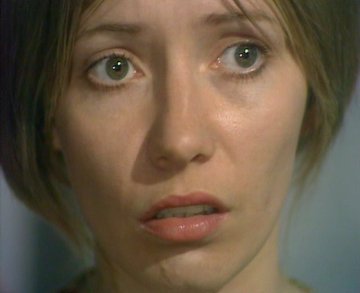
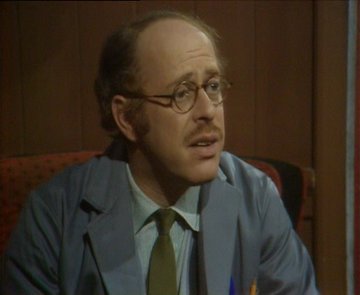
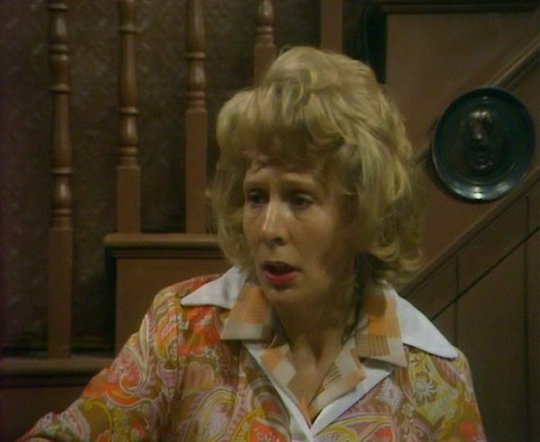
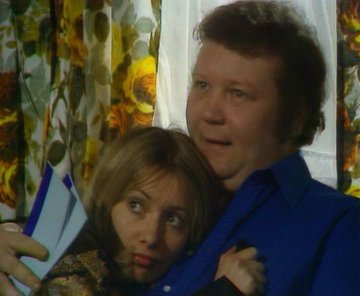
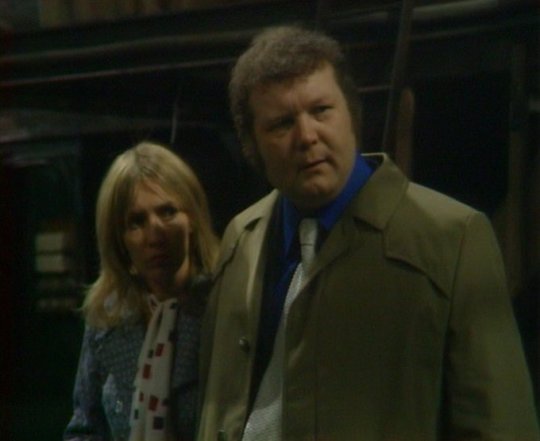


Villains: Alice Sheree (1.5, LWT, 1972)
"Did he ever say anything about marriage?"
"I don't believe anything he says."
"But there's no idea of waiting for him? For his release?"
"I... don't want to see him again. How could I?"
#Villains#classic tv#LWT#1972#Jim Goddard#Keith Dewhurst#Sharon Duce#Andrew Brown#Patrick Durkin#Stephanie Bidmead#Clive Swift#Ray Smith#Ken Wynne#Margaret Ward#Jonathan Adams#Frederick Peisley#Brinsley Forde#Lisa Proud#Paul Alexander#Ohhh this is a bleak one. Perhaps the saddest episode yet. Once again we're diverted from the core gang to focus on one of the number#Of people involved on the periphery. This time it's poor Alice who's only real crime is being the girlfriend of gang member Big Mike (and#Also holding onto some of his stolen cash for him; it's left deliberately unclear whether Alice knew she had stolen money in her possession#But it seems equally likely that she didn't much care either way). Unlike the other characters that have featured Alice has already served#Her time; the core gang have escaped after a year inside but Alice served 12 months and has been released the normal way. This leads us to#An examination of the aftermath of prison time and the care (or lack thereof) afforded to former prisoners. Trapped with no real prospects#And staying with parents who clearly resent her (Swift and Bidmead in toe curling performances as 2 of the most unlikeable ppl featured in#The series so far (Swift at any rate)) it seems inevitable that Alice will drift back towards Big Mike now that he is once again at liberty#What follows is a tragic tale of one vulnerable woman who is buffeted from situation outside her control to situation outside her control.#Duce is heartbreaking as Alice particularly in the final scenes; nice to see Durkin in a substantial role too. He was a pretty familiar#Presence on TV in the 70s but often in background roles as heavies or henchmen. As for Ray Smith.. Truly horrible here as a nasty villain
6 notes
·
View notes
Video
youtube
COMING SOON: Galaxy Four | Doctor Who
The partly-missing First Doctor story, Galaxy Four, is returning as an animation, due for release as a DVD, Blu-Ray & Steelbook on 15th November 2021. Find out more here: https://bbc.in/3zhC93s
#Verity Lambert#William Hartnell#Peter Purves#Maureen O'Brien#Stephanie Bidmead#Doctor Who#Doctor Who animations#BBC Studios#Chumbleys#TARDIS
0 notes
Text
@lurking-latinist #…*goes off to look up dizzyingly meta Golden Age mysteries*#they sound marvelous#as does this AU!
I was going to reply to this, but if I start talking books, I may as well just do it in a post, because it’s never going to fit in a tumblr reply.
I haven’t read enough of these particular authors to know if I’ve read their weirdest or have yet to plumb the depths of them. So who knows what else could be lurking out there? Or the rest of their back catalogue could be almost normal.
But it is quite fun, because while Christie, Sayers, Allingham, & Marsh were off writing the serious crime novels & leading the field, there’s also this little band of male authors who sometimes write regular crime novels and sometimes go full on comedy or meta or completely random.
The two biggest examples of this (that I’ve read) is Edmund Crispin’s The Moving Toyshop (which tbh, i found a bit much - I prefer Love Lies Bleeding in which Love’s Labours Won turns up at a school and people inevitable get murdered in the rush to get ahold of it. but that is practically normal). It’s very random indeed. The most meta I’ve yet found, as I said, is Michael Innes The Daffodil Affair, a book which I keep because otherwise I wouldn’t be sure I hadn’t just started misremembering things, but basically a horse and a house get stolen and by the end the characters are complaining about being stuck in a Michael Innes book. (But he also writes some straightforward classics like The Death at the President’s Lodgings so you just never know what you will get. Could be whimsical meta, could be classic crime.)
John Dickson Carr is fast becoming my fave of this group, though, but he’s been hard to get hold of since I discovered him (but seems to be being reprinted at last!). He’s more humorous than meta, but certainly plenty of random. I’m reliably informed that at least one (or two?) feature time travel. (I can’t remember which one, but it must be one of the three I was strongly recced by my flist when it came up, those being The Burning Court, Fire, Burn! & The Devil in Velvet.)
I have very much enjoyed his And So To Murder and The Case of the Constant Suicides, which both had great tropey premises in them (UC generator eat your heart out. I give you “omg there was only one first class sleeping compartment in the overnight train to Scotland & it turns out we’ve been conducting a war in the letters section of the newspaper” and “two authors hired by a film studio to adapt each other’s books, written in genres they can’t stand.”)
But it’s like this whole random subgenre. Look out for the tatty Penguin greenbacks, in short.
#detectives#golden age crime#books#john dickson carr#carter dickson#edmund crispin#michael innes#there may be others#but those are the main three in this category that i know of#although allingham can sometimes lean that way too#also as a by-note#the bbc adapted and so to murder in the 60s with the 100% perfect casting of suzanne neve#william russell#and stephanie bidmead#but then they burninated it#(it was an anthology series called detective!#and if talking pictures want to find some of that#they have my support)
13 notes
·
View notes
Text
"Little Women" Posthumous Reunion: Final Resting Places of the People Behind the Novel and Its Adaptations
As a fan of the YouTube channel Hollywood Graveyard and the "Posthumous Reunion" pages on FindAGrave.com, I thought I would make a similar tribute to the people behind Little Women and its best-known screen adaptations. This is a guide to the burial sites (if they exist) of all the adaptations' leading actors and creative team members who have died, as well as those of the Alcott family and their friends, for anyone who hopes to visit them someday.
@littlewomenpodcast, @joandfriedrich, @thatscarletflycatcher
Arlington National Cemetery – Arlington, Virginia, USA
John Davis Lodge (John Brooke, 1933 film)
Cementerio de Benalmádena – Benalmádena, Spain
Paul Lukas (Friedrich Bhaer, 1933 film)
Ceder Hill Cemetery – Hartford, Connecticut, USA
Katharine Hepburn (Jo, 1933 film)
Cimitero Flaminio – Rome, Italy
Rossano Brazzi (Friedrich Bhaer, 1949 film)
Cimitiére Communal de Montrouge – Montrouge, France
May Alcott Nieriker (real-life Amy) (site unknown)
Forest Lawn Memorial Park, Glendale – Glendale, California, USA
Edna May Oliver (Aunt March, 1933 film)
June Allyson (Jo, 1949 film)
Elizabeth Taylor (Amy, 1949 film)
Robert Young (Mr. Laurence, 1978 miniseries)
George Cukor (director, 1933 film)
Mervyn LeRoy (director/producer, 1949 film)
Max Steiner (music, 1933 and 1949 films)
Adolph Deutsch (music, 1949 film)
Forest Lawn Memorial Park, Hollywood Hills – Los Angeles, California, USA
Jean Parker (Beth, 1933 film)
Leon Ames (Mr. March, 1949 film)
Holy Cross Cemetery – Culver City, California, USA
Mary Astor (Marmee, 1949 film)
Inglewood Park Cemetery – Inglewood, California, USA
Samuel S. Hinds (Mr. March, 1933 film)
Kensico Cemetery – Valhalla, New York, USA
Henry Stephenson (Mr. Laurence, 1933 film)
Mortlake Crematorium – Richmond, Greater London, England
Pat Nye (Hannah, 1970 miniseries)
Mount Hope Cemetery – Hastings-on-Hudson, New York, USA
Lucile Watson (Aunt March, 1949 film)
Oak Hill Cemetery – Lawrence, Kansas, USA
Alf Whitman (real-life Laurie)
Pleasant View Cemetery – Lyme, Connecticut, USA
Joan Bennett (Amy, 1933 film)
Savannah Cemetery – Savannah, Tennessee, USA
Elizabeth Patterson (Hannah, 1949 film)
Shiloh Cemetery – Shiloh, Illinois, USA
Mary Wickes (Aunt March, 1994 film)
Sleepy Hollow Cemetery – Concord, Massachusetts, USA
Louisa May Alcott (author and real-life Jo)
Abigail May Alcott (real-life Marmee)
Amos Bronson Alcott (real-life Mr. March)
Anna Alcott Pratt (real-life Meg)
John Bridge Pratt (real-life John Brooke)
Elizabeth Sewall Alcott (real-life Beth)
Henry David Thoreau (possible real-life Friedrich Bhaer)
Sparkman Hillcrest Memorial Park – Dallas, Texas, USA
Greer Garson (Aunt March, 1978 miniseries)
St. Leonard’s Churchyard – Hove, East Sussex, England
C. Aubrey Smith (Mr. Laurence, 1949 film)
Valhalla Memorial Park – North Hollywood, California, USA
Mabel Colcord (Hannah, 1933 film)
Westwood Village Memorial Park – Los Angeles, California, USA
Janet Leigh (Meg, 1949 film)
Cremated, Ashes Held Privately or Scattered
Frances Dee (Meg, 1933 film)
Douglass Montgomery (Laurie, 1933 film)
Peter Lawford (Laurie, 1949 film)
Patrick Troughton (Mr. March, 1970 miniseries)
Jean Anderson (Aunt March, 1970 miniseries)
Dorothy McGuire (Marmee, 1978 miniseries)
Richard Gilliland (Laurie, 1978 miniseries)
William Schallert (Mr. March, 1978 miniseries)
Virginia Gregg (Hannah, 1978 miniseries)
Angela Lansbury (Aunt March, 2017 miniseries)
Michael Gambon (Mr. Laurence, 2017 miniseries)
Sarah Y. Mason (screenwriter, 1933 and 1949 films)
Victor Heerman (screenwriter, 1933 and 1949 films)
Merian C. Cooper (producer, 1933 film)
Donated to Medical Science
Spring Byington (Marmee, 1933 film)
Unknown (Not Made Public or No Information Online)
Ladislas Wisniewski (real-life Laurie)
Richard Stapley (John Brooke, 1949 film)
Stephanie Bidmead (Marmee, 1970 miniseries)
Frederick Jaeger (Friedrich Bhaer, 1970 miniseries)
John Welsh (Mr. Laurence, 1970 miniseries)
John Neville (Mr. Laurence, 1994 film)
David Hempstead (screenwriter, 1933 film)
Elmer Bernstein (music, 1978 miniseries)
#little women#find a grave#actors#actresses#creative team#louisa may alcott#alcott family#graves#burial#cremation#tw: death
6 notes
·
View notes
Text




Doomwatch: The Web Of Fear (2.8, BBC, 1971)
"Shouldn't you wear a hat?"
"Never wear a hat, spoils me hairdo."
"What about the spiders?"
"They wanna wear hats, it's entirely up to them."
#doomwatch#the web of fear#Bbc#1971#classic tv#John Paul#Simon oates#Jean trend#Joby blanshard#Vivien sherrard#John nolan#Glyn owen#Stephanie bidmead#Anthony newlands#John savident#Michael elwyn#John lee#Walter horsbrugh#Gerry davis#Eric hills#This feels like the first episode to get back to that early feel of the series with killers rats and melting aeroplanes#It's proper creepy tv horror about killer spiders and tense crawls through spider infested mines. Also it has quite a dw feel in that sense#Too. A very good guest cast as well with old reliables Newlands and Lee and best of all Glyn Owen and Stephanie Bidmead as a#Rather fragile scientist couple. Their domestic drama which might otherwise feel like padding actually adds to the episode as a whole and#Makes this a satisfying one. Poor old Glyn. I knew it was him before he even stepped onscreen just from his bellowing. Bidmead is sweet too#Sad face. Elsewhere John Savident appears to be standing in for John Barron (as long as its a John its fine) (unless he is a different#Minister of course... He's minister for health and thinking about it im pretty sure Barron wasn't that. Whatever he was.) (also is Barron#Still alive?? I hope so..). And Duncan is back yayy. I'm not sure why i like Duncan so much. He's just one of those background characters#You get weirdly attached to (and as @thisbluespirit will know im a sucker for continuity and recurring elements in my old tv). Final word#On this episode: It's very tense and creepy and then Ridge turns up and makes so many jokes in a short period of time that its all ok
2 notes
·
View notes
Text
#This feels like the first episode to get back to that early feel of the series with killers rats and melting aeroplanes#It's proper creepy tv horror about killer spiders and tense crawls through spider infested mines. Also it has quite a dw feel in that sense#Too. A very good guest cast as well with old reliables Newlands and Lee and best of all Glyn Owen and Stephanie Bidmead as a#Rather fragile scientist couple. Their domestic drama which might otherwise feel like padding actually adds to the episode as a whole and#Makes this a satisfying one. Poor old Glyn. I knew it was him before he even stepped onscreen just from his bellowing. Bidmead is sweet too#Sad face. Elsewhere John Savident appears to be standing in for John Barron (as long as its a John its fine) (unless he is a different#Minister of course... He's minister for health and thinking about it im pretty sure Barron wasn't that. Whatever he was.) (also is Barron#Still alive?? I hope so..). And Duncan is back yayy. I'm not sure why i like Duncan so much. He's just one of those background characters#You get weirdly attached to (and as @thisbluespirit will know im a sucker for continuity and recurring elements in my old tv). Final word#On this episode: It's very tense and creepy and then Ridge turns up and makes so many jokes in a short period of time that its all ok
But more importantly, Road Sense is getting daring - “overtaking!” Oh my... Viewers must have passed out from the excitement. ;-p
Hey, background characters make the world go round, and continuity is the best, just ask Michael Chapman. Or something. In my head this ep was later than this, but then everything fades after the introduction of Fay Chantry, James Maxwell turning up and the jetlag one. I had forgotten it had Stephanie Bidmead in, always a good thing. /also sad face.
I have a feeling, then, you must be approaching Duff Ep #2: At Least Not As Boring As #1 But Aargh Sexism, Thanks. But I clearly need to rewatch things and will swear to nothing at this stage.




Doomwatch: The Web Of Fear (2.8, BBC, 1971)
"Shouldn't you wear a hat?"
"Never wear a hat, spoils me hairdo."
"What about the spiders?"
"They wanna wear hats, it's entirely up to them."
2 notes
·
View notes